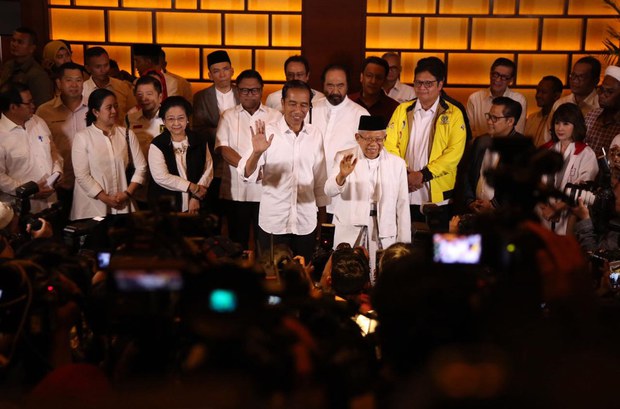Indonesia’s Jokowi Claims Win in Presidential Polls
2019.04.17
Jakarta
 Incumbent President Joko Widodo and running mate Ma'ruf Amin (front and center) appear at a news conference at the Djakarta Theater in the Indonesian capital after results of unofficial quick counts showed them leading in the presidential election, April 17, 2019.
Incumbent President Joko Widodo and running mate Ma'ruf Amin (front and center) appear at a news conference at the Djakarta Theater in the Indonesian capital after results of unofficial quick counts showed them leading in the presidential election, April 17, 2019.
Updated at 2:58 p.m. ET on 2019-04-17
Incumbent Joko “Jokowi” Widodo claimed victory in his quest for a second term, citing unofficial results from Indonesia’s presidential polls showing that he outperformed challenger Prabowo Subianto by 10 percentage points in Wednesday voting.
Jokowi and running mate Ma’ruf Amin captured at least 55 percent of the vote compared to the rival ticket of Prabowo and Sandiago Uno, who drew 45 percent, according to projections of votes by five independent pollster groups – known as “quick counts.”
“Based on the results of quick counts by credible pollsters, it appears that I and Ma’ruf Amin are trusted by the Indonesian people to be president and vice president for the period of 2019-2024,” the Jokowi-Ma’ruf campaign team quoted the president as saying in a statement issued on Wednesday evening.
Prabowo, however, disputed the quick count-results with a counter claim that he had garnered more votes than Jokowi and won his re-match with Jokowi in presidential polls.
The former general said he had captured more than 60 percent of the vote, adding he had “real numbers” from his own exit poll monitors to back up his assertion.
“Based on the real count, we are in the position of 62 percent. This is the real count, from 320,000 polling stations, or about 40 percent. I have been told by statisticians that this won't change,” Prabowo said at his house in South Jakarta on Wednesday evening, in remarks broadcast on TVOne.
Meanwhile, unofficial parliamentary results from quick counts showed nine parties passing the threshold of 4 percent of votes required to have seats in the lower House of Representatives, the DPR.
The top three winners were Jokowi’s Indonesian Democratic Party of Struggle (PDIP) with 20.31 percent of votes; Prabowo’s Gerindra with 12.91 percent; and Golkar, the party of the late former president Suharto, with11.79 percent, according to projected results from pollster Litbang Kompas.
Fourth and fifth place went to two faith-based parties, the Islamic National Awakening Party (PKB) and Prosperous Justice Party (PKS), with 9.32 percent and 8.62 percent of votes, respectively.
Other parties projected to win seats in parliament included the Democrat Party of former President Susilo Bambang Yudhoyono (8.18 percent); Nasdem (7.99 percent); the National Mandate Party (PAN) (6.52 percent); and faith-based United Development Party (PPP) (4.52 percent).
Prabowo: ‘Remain calm’
Quick counts have proven accurate in predicting winners in past elections in Southeast Asia’s largest nation.
The projections for both the presidential and parliamentary elections were based on more than 97 percent of sample votes counted by the five pollster groups at polling sites nationwide.
Commenting on the quick counts at a press conference in the late afternoon, Jokowi called for national unity and patience.
“We have to maintain our cohesion after the election,” Jokowi told reporters at a theater in Jakarta late Wednesday afternoon as Ma’ruf stood by his side.
“We have seen the results of exit polls and quick counts, but we have to be patient, while awaiting official results from KPU (the General Election Commission),” the president said then.
Official results from the General Election Commission are not expected until late May.
After the polls closed, Prabowo urged his supporters to monitor official vote counting to guard against electoral fraud.
“There have been attempts by polling agencies to manipulate public opinion to make it look like we have lost,” he said.
“I call on my supporters to remain calm and not to be provoked into anarchic action,” he said.
Polls released in the run-up to Wednesday’s unprecedented election showed the presidential incumbent enjoying a comfortable two-digit lead. Jokowi, who was seeking a second term, also ran against Prabowo in the 2014 presidential election, in which he narrowly defeated the retired army general.
About 80 percent of 190 million eligible Indonesians turned out Wednesday to vote at some 800,000 polling stations across the country, according to the Center for Strategic and International Studies, a Jakarta think tank.
The vote was historic because it was the first time the country held those elections simultaneously along with regional assembly polls.
And its scale was massive.
The polls were open from 7 a.m. to 1 p.m. across the Indonesian archipelago, which spans three time zones.
Voters fanned out at polls across the Indonesian archipelago on Wednesday to elect 575 members of the House of Representatives (DPR), 136 members of the Regional Representative Council (DPD) and nearly 20,000 members of local legislatures in 548 provinces, districts and municipalities.







